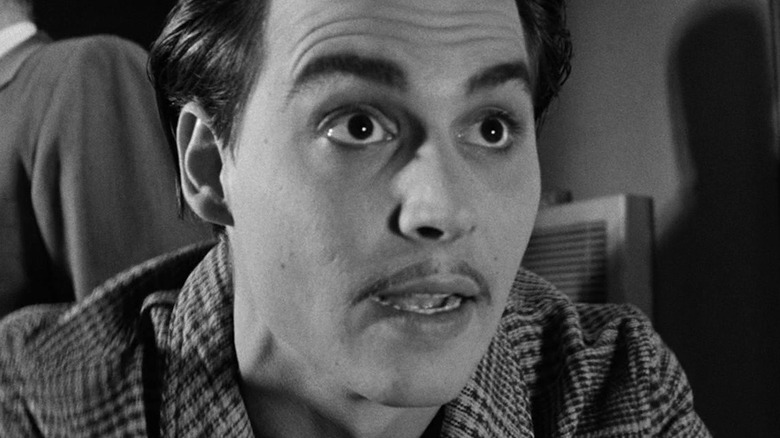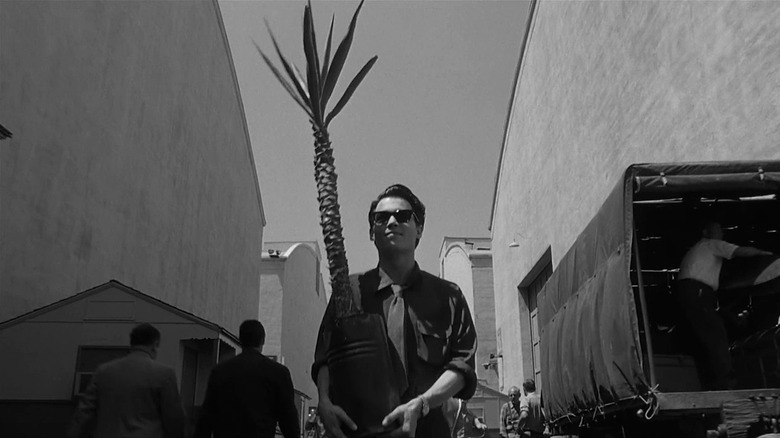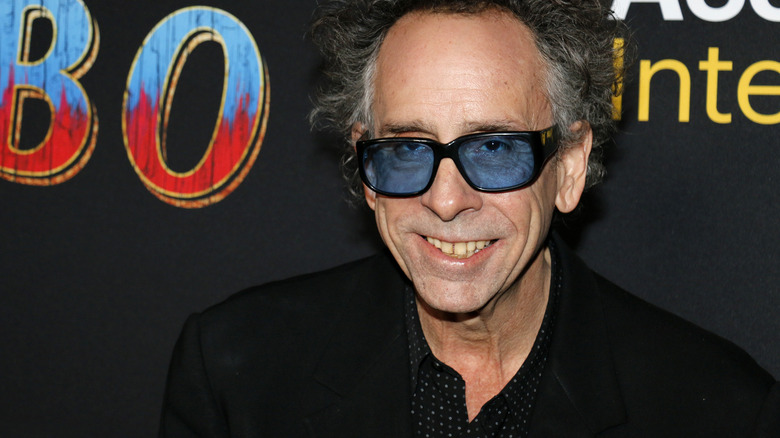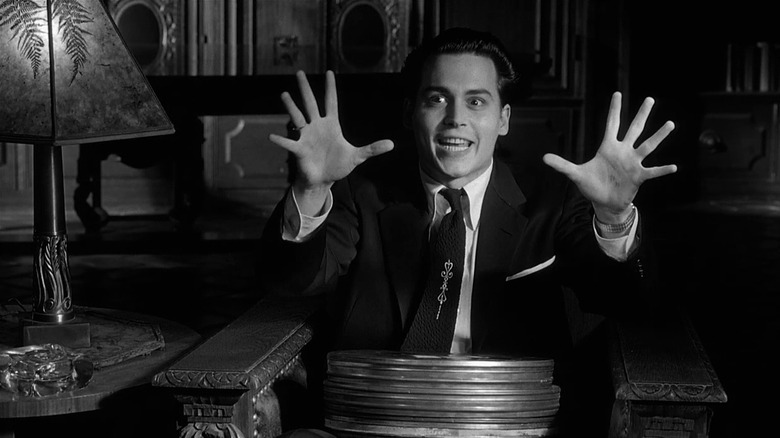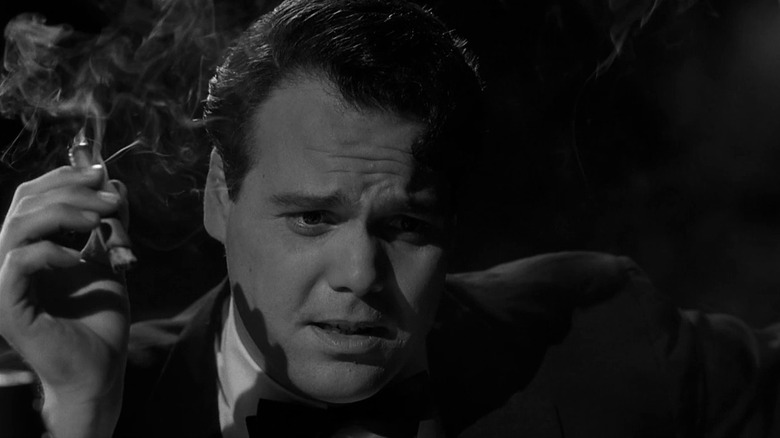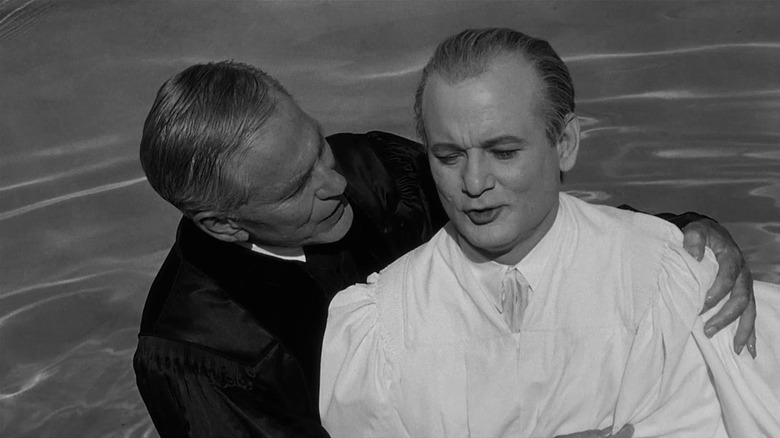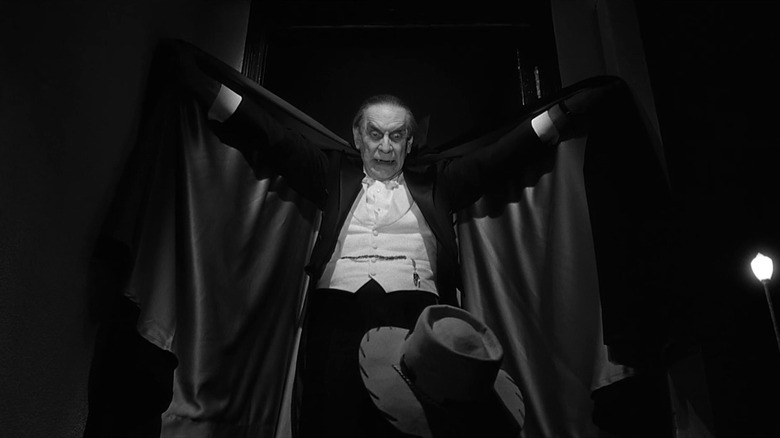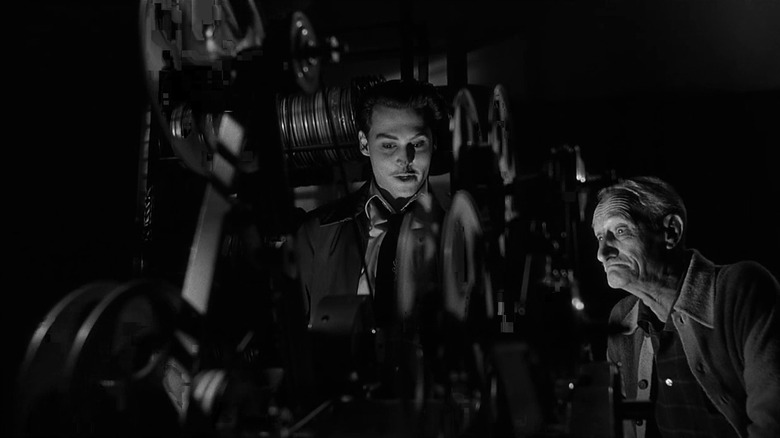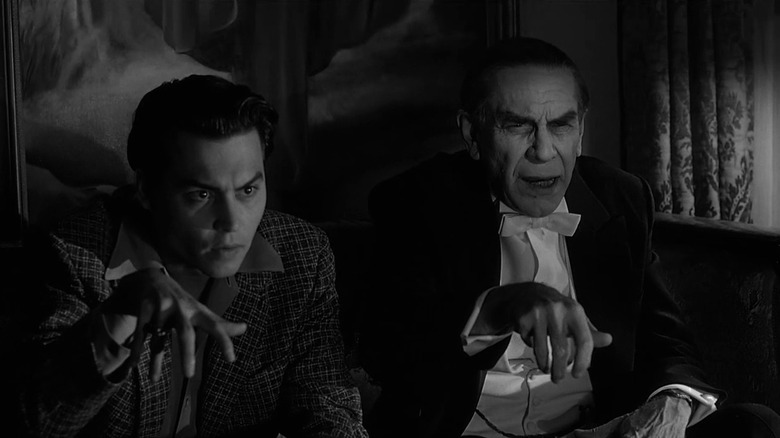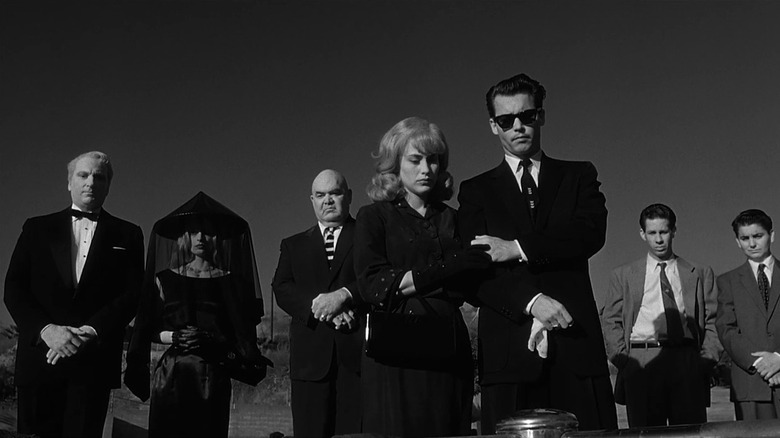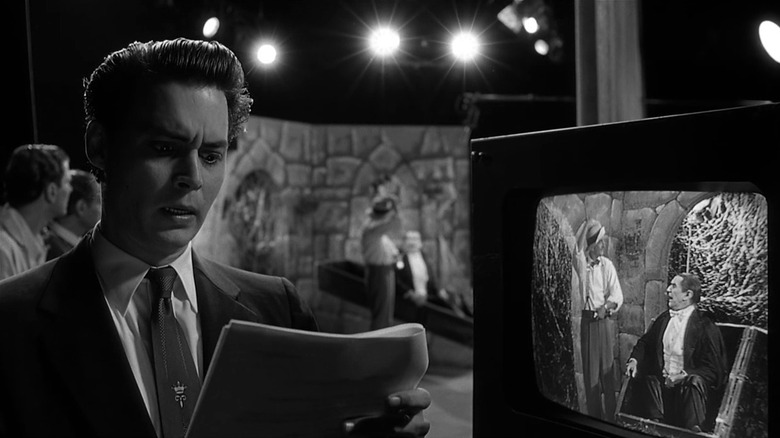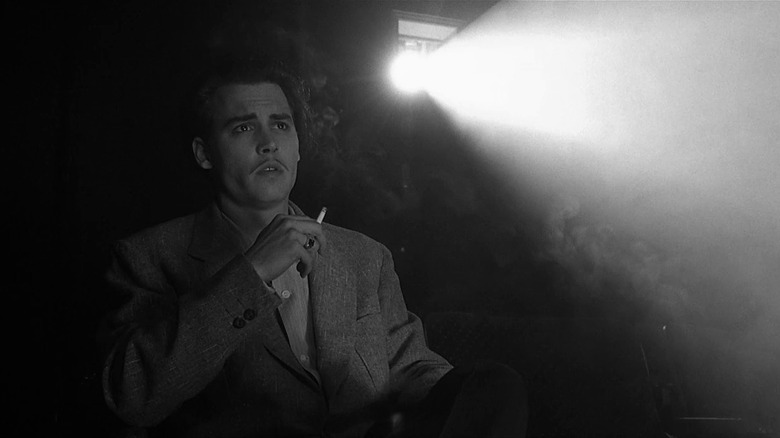The Untold Truth Of Ed Wood
Ed Wood never got much respect when he was alive. Frequently hailed as "the worst director of all-time," Ed Wood was famous for helming legendary B-movies like "Glen or Glenda" or "Plan 9 from Outer Space." After his passing, though, his reputation has seen an increase in reappraisals (as in Den of Geek), with many now seeing some virtues in his reviled works. That reputation has only been aided by the presence of the 1994 feature "Ed Wood." Directed by Tim Burton and starring Johnny Depp as the titular filmmaker, this project was greeted with critical acclaim when it was released and has endured as a widely beloved feature since that debut.
The untold truth of "Ed Wood" speaks to the level of commitment and detail Burton and company put into this feature, with such intricacies heavily informing the general reputation of this ode to a divisive filmmaker. Whether it's in the thought process behind the movie's cinematography, the details that were meant to subvert movie biopic norms, or the way Martin Landau approached his on-screen performance, among many other details, you can discern all the effort that went into making "Ed Wood" a remarkable motion picture. The time has come to improve your future (the place where you and I are going to spend the rest of our lives) by exploring every facet of the untold truth of "Ed Wood."
Ed Wood was supposed to be made at Columbia Pictures
"Ed Wood" began life as a Columbia Pictures production (via Blu-ray.com). Up to this point in his career, Tim Burton had not worked for this particular American movie studio, with Warner Bros. being his default home thanks to titles like "Beetlejuice" and his two "Batman" features. However, Burton's inaugural Columbia Pictures endeavor was scuttled once the studio got cold feet over spending money on a movie like "Ed Wood" that was going to be shot in black and white. With Burton refusing to compromise on this facet of "Ed Wood," the title was now in need of a new home.
Luckily, Warner Bros. wasn't the only studio that the auteur had worked at in his Hollywood career. Burton actually got his start at Disney Animation, where he worked on projects like "The Fox and the Hound." Disney and Burton had already reunited with "The Nightmare Before Christmas," and now "Ed Wood" provided a further chance for the studio to develop a good relationship with the filmmaker. Thus, Disney took on "Ed Wood" and produced it through its adult-skewing Touchstone Pictures label. While this particular collaboration between Burton and Columbia Pictures didn't work out, the two would eventually manage to deliver a movie together in 2003 with the feature "Big Fish."
Tim Burton felt connected to Ed Wood
"I really feel close to him," Tim Burton said about Ed Wood while on the set of his biopic about the filmmaker (per Blu-Ray.com). Burton expressed a fondness for how Wood kept pursuing the art he loved and a career he cherished even though everyone around him said it was foolish. That relentless optimism in the face of adversity, not to mention his constant sincere love for cinema as a medium, meant that Burton couldn't help but fall in love with Ed Wood as a human being.
Admittedly, Burton didn't always feel this way about the filmmaker, with this director stumbling onto the works of Wood on TV as a kid and initially dismissing the mas nonsense. But as he got older, Burton found "a twisted form of integrity" in the directorial efforts of Wood that made his ramshackle filmmaking captivating. Understanding the reputation Wood had cultivated for being the director of "the worst movie ever made," Burton wanted to make sure the "Ed Wood" movie wasn't two hours of mockery. Instead, he was opting for a tonally complex film that could capture all the wonderful tiny details that made Burton so fascinated with Wood as a director.
Tim Burton refused a salary for Ed Wood
From the outset, it was clear "Ed Wood" was not the kind of movie that makes everyone involved lots and lots of money. This was an unorthodox title told in a monochromatic color scheme about a filmmaker known by movie aficionados but not by the general public. In other words, there was not going to be a lucrative line of Hot Topic merchandise built out of this project. Even with long-term revenue streams for "Ed Wood" looking minimal, though, director Tim Burton refused to take an upfront salary for helming the feature.
Burton was so committed to this feature, as well as to the concept of it getting major studio financing, that he decided to forego a salary (via Den of Geek). The eventual minimal box office impact of this feature ensured that Burton wouldn't see a penny on making "Ed Wood" even in terms of reaping potential profit points on its box office run. However, given the enduring creative legacy of this motion picture, it's likely Burton is fine with not having made cash over bringing to life as personal of a project as "Ed Wood."
Ed Wood was planned to be a subversion of biopics
Many Hollywood biopics are straightforward affairs. Whether they're covering politicians, athletes, or especially musicians, you can often map out the basic narrative beats of these films before you even see them. Nobody was more aware of the widespread predictability of this genre than screenwriters Larry Karaszewski and Scott Alexander when they began penning the script for "Ed Wood." Talking to Money Into Light, Karaszewski noted that part of the impetus for making "Ed Wood" in the first place was that they "felt the biopic genre needed a kick in the a**."
Part of how the duo decided to subvert the standard structure of a biopic was by making sure the film, unlike so many other entries in this genre, didn't end on the death of its main character. Instead, the creation of the infamously bad movie "Plan 9 from Outer Space" served as the capper to this story about a determined artist. Structuring the film like this was also a reminder to this duo about why a movie about Ed Wood was being made in the first place, since the infamous nature of "Plan 9" had turned Wood into a legend. The duo also wrote "The People vs. Larry Flynt," "Man on the Moon," and "Dolemite Is My Name." Though they weren't reinventing the wheel with their "Ed Wood" screenplay, just going in unique directions with the film's structure was enough to ensure it wasn't a common movie biopic.
The Ed Wood script was tailored to Burton's sensibilities
The basic facts of Ed Wood's life, namely his outsider status as well as the kinds of films he liked to make, already made this icon of B-grade cinema somebody who would appeal directly to Tim Burton's sensibilities. However, screenwriters Larry Karaszewski and Scott Alexander wanted to guarantee that this filmmaker would be interested in their biopic about this director. Thus, when they were polishing up their script for "Ed Wood," they wanted to make sure that the screenplay would appeal to Burton specifically.
Talking to Money Into Light, Karaszewski noted that producer Denise Di Novi, who had a working relationship with Burton, and "Heathers" director Michael Lehmann, the original filmmaker attached, first brought up the idea of how much easier it would be to score financing for "Ed Wood" if it managed to garner the interest and participation of Burton or at least a "Tim Burton Presents" credit. Karaszewski noted that the screenplay originally contained "a cemetery scene and Gothic imagery" meant to directly appeal to Burton's sensibilities and make him more interested in the project, though, ironically, those sequences would never make their way into the final cut of Burton's "Ed Wood." The relationship between Wood and Bela Lugosi also mirrored Burton's similar dynamic with Vincent Price. With these qualities in place, the screenplay was ensured to be something that would be extra appealing to Burton, and the director proved to be a huge fan.
Tim Burton considers Ed Wood one of his best movies
In the career of Tim Burton, it'd be difficult to pick out just one film to serve as the best in his entire catalogue. If you're a fan of his most expressionistic exercises, his two "Batman" movies are bound to tickle your fancy. By contrast, those more partial to the most adult-skewing entries in his canon will likely gravitate toward "Sweeney Todd." Still others may find themselves choosing the likes of "Edward Scissorhands" or "Big Fish" as examples of Burton at the peak of his filmmaking prowess. There are lots of quality and beloved features to choose from here, and "Ed Wood" was no exception to that trend.
Talking to GamesRadar+, Burton was asked which of his movies he found to be his absolute best. When posed with this inquiry, Burton found himself thinking of a trio of motion pictures, including "Ed Wood" (as well as "Edward Scissorhands" and "The Nightmare Before Christmas"). Given that Burton has a long-standing affection for Wood's movies, not to mention that this movie garnered some of the best reviews of his career, it's no surprise that Burton would find himself looking back on "Ed Wood" with fondness. It's also no surprise that he wouldn't be able to choose just one film, as there's certainly no shortage of options in Burton's filmography.
Tim Burton wanted Martin Landau to play Bela Lugosi
It's easy to imagine why anyone would want Martin Landau in their movie. This esteemed performer has decades of acclaimed performances under his belt, from "Mission: Impossible" to "North by Northwest," and has often shown a gift for lending gravitas to the most ludicrous concepts and characters. Those qualities alone would be enough to make Landau an attractive proposition for any director, but there was something more going on with Tim Burton's creative process when he pegged Landau as the perfect guy to play Bela Lugosi.
Talking to The Baltimore Sun, Landau admitted that several roles in his career were for low-grade films, some of them even straight-to-video disasters, that weren't far off in budget and quality to the films Ed Wood himself directed. Burton also reminded Landau of this fact upon calling him up about a role in "Ed Wood," though there was an important reason for these comments from Burton. In this filmmaker's mind, Landau's varied career intersected beautifully with Lugosi's filmography. Realizing the parallels between the two actors, Burton couldn't stop thinking about how great Landau would be portraying this horror movie icon. Even if getting the role required a reminder about his forgettable paycheck gigs, Landau ended up flourishing in the part, especially once he won an Oscar for his efforts in "Ed Wood."
The film was a challenge to shoot
The cinematography of "Ed Wood" went much deeper than just filming it in a monochromatic color scheme consistent with the color palette in classic Ed Wood directorial efforts. Cinematographer Stefan Czapsky said that he always struggled to figure out how to balance out visuals that served as a tip of the hat to the "blandness" that permeated Wood's films while also taking advantage of the rich visual opportunities of black-and-white photography (per Blu-Ray.com). Part of this balance included replicating the tiniest imperfections of Wood's original filmmaking when "Ed Wood" depicts the filmmaker creating works like "Plan 9 from Outer Space."
This extremely unique hurdle proved to be arduous to execute on the set, but Czapsky's efforts ended up paying off in spades in the final cut of "Ed Wood." The cinematography of this feature became one of its most acclaimed facets, earning multiple cinematography prizes and with no less than Roger Ebert dubbing this aspect of the production a triumph in "convincingly [recapturing] the look and feel of 1950s sleaze, including some of the least convincing special effects in movie history." Sometimes, to score critical praise, you have to show fidelity to critically derided artistry.
Martin Landau and Tim Burton were a perfect match
When it comes to Martin Landau's performance as Bela Lugosi in "Ed Wood," one might assume that his preparation and execution of this role boiled down simply to mimicking Lugosi. But to make this horror cinema legend someone discernibly human, Landau had to go much deeper than that with his physicality and line delivery. Not only that, but Burton's idiosyncrasies as a filmmaker aren't just limited to an affinity for Gothic imagery. He's also got a unique approach to handling actors that also heavily informed how Landau executed his performance as Lugosi.
Talking to Den of Geek, Landau observed, "There's a theatricality and a special kind of thing to Tim's work." Specifically, he notes that his exchanges with the director are often short sentences, with each of the two men able to understand what the other wants or needs without having to speak their mind entirely. Landau also noted that, in his experience, gifted filmmakers don't create an abundance of restrictions for the actor, which he saw Burton as being especially gifted at doing. With this kind of freedom and unique communication on-set, Landau could have the proper space to deliver beloved performances for Tim Burton like his work as Lugosi in "Ed Wood."
Ed Wood's sets were surprisingly expansive
Though a grounded adult drama rather than a lavish fantasy or superhero movie, "Ed Wood" still employed the kind of detailed and expansive sets one would expect from a Tim Burton directorial effort. As relayed by Blu-Ray.com, this included the ironic detail that it took a lot of time and effort to recreate the ultra-low-budget sets that Ed Wood had used in his original features. Props that he and his team had just found lying around in the 1950s were now recreated here by production designer Tom Duffield and his crew at a great cost. There were eventually enough sets made that, at one point, the production had 20 individual sets up simultaneously.
The most elaborate of these was a haunted house attraction that served as a backdrop between Ed Wood and a potential lover. Though it would only be used for this single sequence, the "Ed Wood" team still put together fully operational frights, like mechanical ghosts, within this haunted house to accentuate its authenticity. The original works of Ed Wood were bargain-basement endeavors that were lucky to have multiple chairs in one shot. Meanwhile, the sets in "Ed Wood," though riddled with intentional imperfections, were expansive efforts that reflected the team's dedication to paying tribute to Wood's world and filmmaking.
Ed Wood underperformed at the box office
Many of Tim Burton's works deliver extremely idiosyncratic and strange creative visions that, somewhat paradoxically, managed to connect with wide swathes of the moviegoing public. The world didn't even know it needed characters like Beetlejuice or Edward Scissorhands before they came along, but once they arrived in movie theaters, people couldn't get enough of them. However, Burton's works haven't been bulletproof at the box office. Projects like "Dark Shadows" and "Dumbo" came up mighty short compared to pre-release expectations. Unfortunately for Burton, his passion project "Ed Wood" also struggled mightily at the box office.
Internationally, "Ed Wood" grossed just $5.8 million on an $18 million budget. That's by far the lowest global sum for a Burton feature, with no other movie of his making less than $27 million worldwide. "I loved 'Ed Wood,'" Burton told GamesRadar+. "For me, it's as good, if not better, than a lot of the other ones I've done that made a lot more money." Ed Wood isn't a household name, so the appeal was always going to be niche, while its $18 million budget ensured that Walt Disney Studios Motion Pictures didn't lose much cash on it. Plus, there were some peculiar choices in how Disney released "Ed Wood" in North America, like rushing it into wide release in its second weekend, that doubtlessly hindered its box office potential. But whatever the reason, "Ed Wood" was an indisputable box office misfire in its original run.
It solidifies and celebrates the creative legacy of Ed Wood
On some levels, "Ed Wood" is a more obscure entry in the filmography of Tim Burton. Even aside from its obvious box office woes, the film has not become merchandised like "Beetlejuice" or "Edward Scissorhands." Meanwhile, it's not connected to constantly popular franchises like "Batman," "Pee-Wee's Big Adventure," or "Alice in Wonderland," all of which can be assured at least some level of interest and success for years to come. Plus, being an R-rated movie about a 1950s director, it's not as family-friendly as his most beloved films, which further limits its audience.
But what it lacks in marketability and appeal to families, "Ed Wood" makes up for and then some in its constant garnering of critical praise. Outlets like Den of Geek have dubbed the film not only the greatest Tim Burton directorial effort but also the one most reflective of the filmmaker's sensibilities. A more intimate affair with no fight scenes or CGI monsters in sight, "Ed Wood" can get at the heart of an outsider artist who finds solace in making offbeat movies that so many people don't understand. It's easy to see how Burton could find personal relevance in such a figure, and his obvious passion for Ed Wood as a man is clear. That fueled the deeply personal and entertaining nature of "Ed Wood" as a film and ensured that it scored one of the most impressive critical legacies in the canon of Tim Burton movies.
